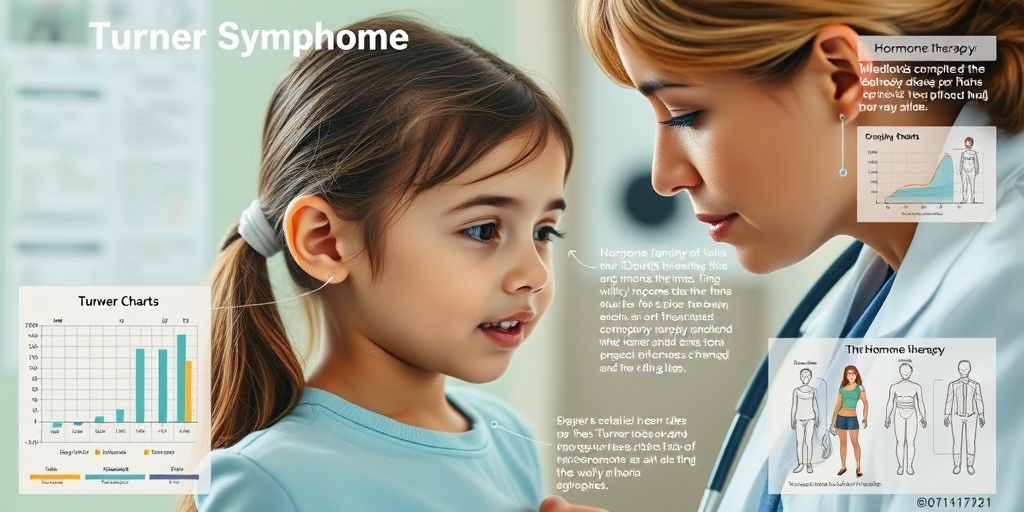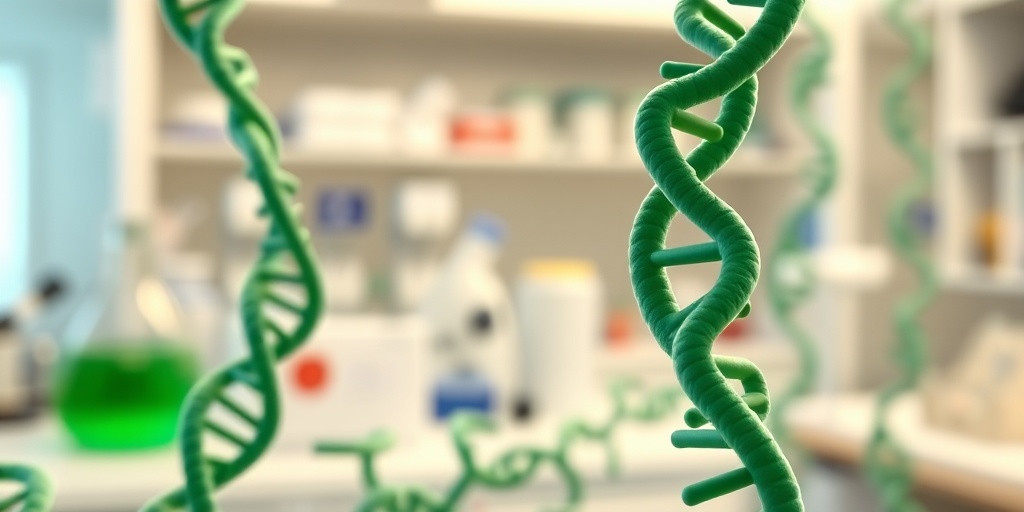What Is Turner Syndrome?
Turner Syndrome is a genetic condition that affects females, resulting from a complete or partial absence of one of the two X chromosomes. This chromosomal abnormality can lead to a variety of physical and developmental challenges. The condition is named after Dr. Henry Turner, who first described it in the 1930s. It is estimated to occur in about 1 in 2,500 live female births, making it one of the most common chromosomal disorders.
Individuals with Turner Syndrome typically have a range of features and health issues, but the severity can vary widely. Some may experience significant health challenges, while others may lead relatively normal lives with appropriate medical care and support.
Understanding the Genetics of Turner Syndrome
Turner Syndrome is primarily caused by a missing or incomplete X chromosome. In most females, the genetic makeup includes two X chromosomes (XX), but in those with Turner Syndrome, the karyotype may present as 45,X or other variations such as 45,X0 or 46,XX/45,X mosaicism. This genetic difference can lead to various developmental and physical characteristics.
Causes and Risk Factors
The exact cause of Turner Syndrome is not fully understood, but it is believed to occur randomly during the formation of reproductive cells or in early fetal development. There are no known lifestyle or environmental factors that increase the risk of Turner Syndrome. It is important to note that this condition is not inherited; rather, it occurs sporadically.
Turner Syndrome Symptoms
Turner Syndrome presents a variety of symptoms that can affect physical development, health, and overall quality of life. While some individuals may exhibit many of these symptoms, others may have only a few. Here are some common symptoms associated with Turner Syndrome:
Physical Features
- Short stature: One of the most noticeable characteristics is a shorter than average height, often becoming apparent during childhood.
- Webbed neck: Many individuals with Turner Syndrome have a webbed neck, which can give the appearance of a broader neck.
- Low-set ears: The ears may be positioned lower on the head than usual.
- Broad chest: A wide chest with widely spaced nipples is another common feature.
- Delayed puberty: Many girls with Turner Syndrome experience delayed onset of puberty due to ovarian dysfunction.
Health Issues
In addition to physical features, Turner Syndrome can lead to various health complications, including:
- Heart defects: Some individuals may have congenital heart defects, which can require monitoring and treatment.
- Kidney problems: Abnormalities in kidney structure and function are also common.
- Bone health: There is an increased risk of osteoporosis and fractures due to lower bone density.
- Thyroid issues: Hypothyroidism is more prevalent among those with Turner Syndrome.
- Infertility: Most individuals with Turner Syndrome are unable to conceive naturally due to ovarian insufficiency.
Emotional and Social Considerations
Beyond physical symptoms, Turner Syndrome can also impact emotional and social development. Many individuals may face challenges related to self-esteem, social interactions, and academic performance. Early intervention and supportive therapies can help address these issues, fostering a positive self-image and social skills.
Seeking Support and Treatment
If you suspect that you or someone you know may have Turner Syndrome, it is crucial to seek medical advice. A healthcare provider can conduct genetic testing and provide a comprehensive evaluation. Treatment options may include hormone therapy to promote growth and development, as well as regular monitoring for associated health issues.
For more information and resources on Turner Syndrome, consider visiting Yesil Health AI, where you can find evidence-based health answers and support.
Understanding Turner Syndrome is essential for those affected and their families. With the right support and medical care, individuals with Turner Syndrome can lead fulfilling lives. 🌟

Turner Syndrome Diagnosis
Diagnosing Turner Syndrome can be a complex process, as the symptoms and features can vary significantly from one individual to another. This genetic condition affects females and is characterized by the partial or complete absence of one of the two X chromosomes. Early diagnosis is crucial for managing the condition effectively and improving the quality of life for those affected.
Initial Signs and Symptoms
Parents and healthcare providers often notice certain signs that may prompt further investigation. Common symptoms of Turner Syndrome include:
- Short stature: Many girls with Turner Syndrome are shorter than their peers.
- Delayed puberty: The onset of puberty may be significantly delayed or absent.
- Heart defects: Some individuals may have congenital heart issues.
- Ovarian dysfunction: This can lead to infertility and other hormonal imbalances.
- Distinctive physical features: These may include a webbed neck, low-set ears, and a broad chest.
Diagnostic Tests
If Turner Syndrome is suspected, healthcare providers typically recommend a series of diagnostic tests, including:
- Karyotype analysis: This blood test examines the number and structure of chromosomes. A typical result for someone with Turner Syndrome shows a missing or incomplete X chromosome (45,X).
- Ultrasound: Prenatal ultrasounds can sometimes detect physical anomalies associated with Turner Syndrome.
- Hormonal tests: These tests assess hormone levels to evaluate ovarian function and other endocrine issues.
Early diagnosis through these methods can lead to timely interventions, such as growth hormone therapy and estrogen replacement therapy, which can significantly improve the health and well-being of individuals with Turner Syndrome.
Turner Syndrome Causes
The exact cause of Turner Syndrome is linked to genetic factors, specifically involving the X chromosome. Understanding these causes can help demystify the condition and provide insights into its management.
Chromosomal Abnormalities
Turner Syndrome occurs due to a chromosomal abnormality where one of the X chromosomes is missing or altered. This can happen in several ways:
- Monosomy: The most common form, where one X chromosome is completely absent (45,X).
- Partial deletion: In some cases, only a part of one X chromosome is missing.
- Mosaicism: Some individuals may have a mix of normal and abnormal cells, leading to a milder form of the syndrome.
Genetic Factors
While the exact reason why Turner Syndrome occurs is not fully understood, it is believed to be a random event during the formation of reproductive cells (eggs and sperm). This means that it is not inherited from parents, and the likelihood of having a child with Turner Syndrome is not influenced by family history.
Environmental Influences
Research is ongoing to determine if environmental factors may play a role in the development of Turner Syndrome. However, current evidence suggests that it is primarily a genetic condition. Factors such as maternal age and certain environmental exposures during pregnancy are being studied, but no definitive links have been established.
Understanding the causes of Turner Syndrome is essential for parents and caregivers, as it can help them navigate the challenges associated with the condition and seek appropriate medical care and support. With early diagnosis and intervention, individuals with Turner Syndrome can lead fulfilling lives. 🌟

Turner Syndrome Risk Factors
Turner Syndrome is a genetic condition that affects females, resulting from a complete or partial absence of one of the two X chromosomes. Understanding the risk factors associated with Turner Syndrome can help in early diagnosis and management. Here are some key risk factors to consider:
Genetic Factors
The primary cause of Turner Syndrome is a chromosomal abnormality. In most cases, females with Turner Syndrome have only one complete X chromosome, while the second X chromosome is missing or altered. This condition can occur due to:
- Random Errors in Cell Division: Turner Syndrome often arises from errors during the formation of eggs or sperm, leading to an abnormal number of chromosomes.
- Parental Age: Advanced maternal age has been associated with an increased risk of chromosomal abnormalities, although Turner Syndrome can occur in pregnancies at any maternal age.
Family History
While Turner Syndrome is typically not inherited, having a family history of chromosomal abnormalities may slightly increase the risk. Genetic counseling can provide insights for families with a history of such conditions.
Associated Conditions
Some medical conditions may be associated with Turner Syndrome, although they do not directly cause it. These include:
- Congenital Heart Defects: Many individuals with Turner Syndrome may have heart issues, such as coarctation of the aorta.
- Kidney Abnormalities: Some may experience kidney malformations, which can complicate their health.
Environmental Factors
While the genetic basis of Turner Syndrome is well-established, some studies suggest that environmental factors, such as exposure to certain chemicals during pregnancy, might play a role in chromosomal abnormalities. However, more research is needed in this area.
Turner Syndrome Treatment Options
Managing Turner Syndrome involves a multidisciplinary approach tailored to the individual’s needs. Treatment options focus on addressing the symptoms and associated health issues. Here are some common treatment strategies:
Hormone Replacement Therapy (HRT)
One of the most common treatments for Turner Syndrome is hormone replacement therapy. This therapy typically includes:
- Estrogen Therapy: Initiated during puberty to promote the development of secondary sexual characteristics, such as breast development and menstrual cycle regulation.
- Growth Hormone Therapy: Administered in childhood to help increase height and improve overall growth.
Regular Monitoring and Screening
Individuals with Turner Syndrome require regular health check-ups to monitor for associated conditions. This includes:
- Cardiac Evaluations: Regular heart screenings to detect any congenital heart defects.
- Kidney Function Tests: Monitoring kidney health to address any abnormalities early.
Fertility Treatments
Many women with Turner Syndrome may face challenges with fertility. Options include:
- Assisted Reproductive Technologies: Techniques such as in vitro fertilization (IVF) may be considered for those wishing to conceive.
- Egg Donation: Some may opt for using donor eggs if their own ovarian function is impaired.
Psychosocial Support
Living with Turner Syndrome can present emotional and psychological challenges. Support options include:
- Counseling: Professional counseling can help individuals cope with the emotional aspects of the condition.
- Support Groups: Connecting with others who have Turner Syndrome can provide a sense of community and shared experiences.
In conclusion, understanding the risk factors and treatment options for Turner Syndrome is crucial for effective management. Early diagnosis and a comprehensive treatment plan can significantly improve the quality of life for those affected by this condition. 🌟

Living with Turner Syndrome
Turner Syndrome is a genetic condition that affects females, resulting from a complete or partial absence of one of the two X chromosomes. This condition can lead to a variety of physical and developmental challenges, but with the right support and resources, individuals with Turner Syndrome can lead fulfilling lives. Understanding the implications of this syndrome is crucial for both those diagnosed and their families.
Understanding the Symptoms
Individuals with Turner Syndrome may experience a range of symptoms, which can vary widely from person to person. Some common features include:
- Short stature: Most girls with Turner Syndrome are shorter than their peers, often requiring growth hormone therapy to help achieve a more typical height.
- Delayed puberty: Many girls may not experience the onset of puberty without medical intervention, which can include hormone replacement therapy.
- Heart defects: Some individuals may have congenital heart issues, necessitating regular check-ups with a cardiologist.
- Infertility: Due to ovarian dysfunction, many women with Turner Syndrome may face challenges with fertility.
- Learning difficulties: While intelligence is typically normal, some may experience challenges with spatial reasoning and mathematics.
Recognizing these symptoms early can lead to timely interventions, which can significantly improve quality of life. Regular medical check-ups and a supportive environment are essential for managing the condition effectively.
Emotional and Social Aspects
Living with Turner Syndrome can also have emotional and social implications. Many individuals may struggle with self-esteem and body image issues due to their physical differences. It’s important for families and caregivers to foster a supportive environment that encourages open communication and self-acceptance.
Engaging in social activities, joining support groups, and connecting with others who have Turner Syndrome can provide a sense of community and belonging. These connections can be invaluable in helping individuals navigate the challenges they face.
Turner Syndrome Support and Resources
Finding the right support and resources is crucial for individuals with Turner Syndrome and their families. Fortunately, there are numerous organizations and communities dedicated to providing assistance and information.
National and International Organizations
Several organizations focus on Turner Syndrome awareness, research, and support:
- Turner Syndrome Society of the United States: This organization offers resources, educational materials, and support networks for individuals and families affected by Turner Syndrome.
- Turner Syndrome Foundation: They provide information on medical care, research updates, and community support.
- International Turner Syndrome Network: A global community that connects individuals and families across borders, sharing experiences and resources.
Medical Support
Regular medical care is essential for managing Turner Syndrome. This includes:
- Pediatricians: Regular check-ups to monitor growth and development.
- Endocrinologists: Specialists who can provide hormone therapy and manage growth issues.
- Cardiologists: For monitoring and managing any heart-related issues.
- Psychologists or counselors: To support emotional well-being and address any mental health concerns.
Online Communities and Support Groups
In addition to formal organizations, online communities can be a great source of support. Websites and social media groups allow individuals and families to share experiences, ask questions, and find encouragement from others who understand their journey. Some popular platforms include:
- Facebook Groups: Many groups are dedicated to Turner Syndrome, providing a space for sharing stories and advice.
- Reddit: Subreddits focused on Turner Syndrome can offer a more informal setting for discussion and support.
Living with Turner Syndrome presents unique challenges, but with the right support and resources, individuals can thrive. By fostering a strong support network and accessing available resources, families can help their loved ones navigate the complexities of this condition with confidence and resilience. 💪❤️

Frequently Asked Questions about Turner Syndrome
What is Turner Syndrome?
Turner Syndrome is a genetic condition that affects females, characterized by the absence or structural abnormalities of one of the two X chromosomes. This condition can lead to various physical and developmental features.
What are the common symptoms of Turner Syndrome?
- Short stature
- Delayed puberty
- Infertility
- Heart defects
- Kidney problems
- Learning difficulties
How is Turner Syndrome diagnosed?
Diagnosis typically involves a physical examination, a review of medical history, and genetic testing, such as a karyotype analysis, to identify chromosomal abnormalities.
What treatments are available for Turner Syndrome?
Treatment options may include hormone therapy to promote growth and development, fertility treatments, and regular monitoring for associated health issues. Early intervention can significantly improve quality of life.
What is the life expectancy for individuals with Turner Syndrome?
With proper medical care and monitoring, individuals with Turner Syndrome can lead healthy lives. Life expectancy may be slightly reduced due to associated health risks, but many individuals live into their 50s and beyond.
Can Turner Syndrome be inherited?
Turner Syndrome is usually not inherited; it typically occurs as a random event during the formation of reproductive cells. However, in rare cases, it can be associated with genetic factors.
What are the features of Turner Syndrome in babies?
In newborns, features may include swelling of the hands and feet, a webbed neck, and low-set ears. Early diagnosis can help in managing the condition effectively.
Is there a specific diet recommended for individuals with Turner Syndrome?
While there is no specific diet for Turner Syndrome, a balanced diet rich in nutrients is essential for overall health. Consulting with a healthcare provider or nutritionist can help tailor dietary needs.
Where can I find support for Turner Syndrome?
Support groups and organizations dedicated to Turner Syndrome can provide valuable resources, information, and community support. Online forums and local support groups can be beneficial for individuals and families.




